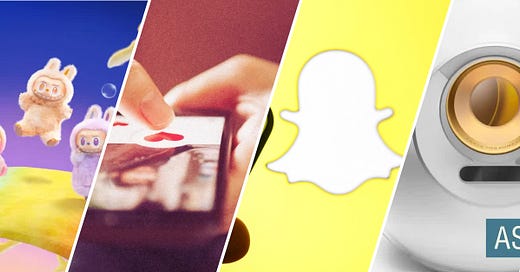I read over 100 articles per week so you don’t have too. Here are the 5 non hospitality news the industry should learn from:
Blind box
To anyone who’s shelled out four figures for a Labubu on the resale market, what are you doing Wednesday night? I’m hosting a dinner. Odds are, you’ll be seated next to someone deep into NFTs. Naturally.
I’d wager the Labubu craze will peak as quickly as it’s bloomed. But if you’ve been living under a rock these past few weeks and haven’t yet encountered one, just open any newspaper or scroll through your social feed. You’ll quickly be introduced to the realm of “ugly cute.”
What intrigued me more than the toys themselves, though, was the “blind box” sales tactic. It’s deceptively simple, and remarkably effective. It recalls the thrill of buying Dragon Ball Z cards, or later, scratch-off lottery tickets. The only difference? Back then, we weren’t filming ourselves for an “unboxing video.”
Trip.com is the only one or the most notable brand experimenting with this model, but it’s definitely not widespread. With the revenge travel era behind us, it’s time to add a fresh dose of surprise to keep things exciting.
Ai generated message on your coffee cup
Sure, the Metaverse may not have been Starbucks’ finest moment, but one thing you can’t deny is their knack for staying ahead of the curve. Now, AI is seamlessly integrated into their stores, allowing employees to get instant answers to their questions.
COVID might be five years behind us, but hospitality’s biggest headaches, labor shortages and high turnover, haven’t gone anywhere. The staffing crunch forces properties to get creative, sometimes hiring anyone willing to work, regardless of formal training.
For budget properties, that’s manageable, but for those with exhaustive process manuals (think: PDFs as thick as novels detailing everything from operating the coffee machine to setting the forks), the learning curve can be brutal. Add to that the reluctance of new hires to ask endless questions on day one, and you’ve got a recipe for chaos.
That’s where AI training shines: with processes already documented, staff can simply ask the bot and get instant guidance. At least, until the bot is ready to take over entirely.
Enhanced guest profile
Hotels are, at their core, about vibes matching between a guest and an innkeeper, much like the dynamic on a dating app. That’s why I’m convinced there’s a strong parallel between the hospitality industry and dating app technology.
A recent study by Match and The Kinsey Institute found that nearly half of Gen Z singles are already using AI to up their dating game, whether by refining their profiles, breaking the ice, or finding better matches. If you believe “personalized guest experience” will be the buzzword of 2025, now’s the time to start integrating AI into every guest profile.
Multiplayer mode
AI remains largely a solo activity. You share little, except when Zuck hides the fact that all your chats are public, exposing your deepest secrets to your friends. Hospitality is inherently a multiplayer activity, so if we want AI travel building to become the OTAs of the future, we need to start shifting our mindset now.
More platforms are adopting a multiplayer mindset. For example, Snap acquired a social calendar for students, and Tinder allows you to set up double dates with a friend while browsing paired users who share at least one preference. In every product I create, I prioritize the multiplayer mode. Catering to the preferences of the entire group, rather than just the reservation owner, saves time and makes the experience more memorable.
The apple of my eye
Entering the US soon? Brace yourself. The trip is not over until you beat the customs queue. It stretches endlessly, partly because only two agents are assigned to process an entire 747, and partly due to the fingerprint scan ritual. The routine, four fingers, twice, followed by both thumbs, sounds as natural as placing a cube into a cube-shaped hole. Yet, you’ll be surprised by some people ability to comply.
Identification, even if necessary, is generally a painful process and also leads to frustration at hotel check-in. Self-identification tools are improving, though they remain patchy and far from universal. Hopefully, Sam Altman's side hustle will save us: Unique ID tied to Web3, what’s not to like? Reddit is reportedly exploring implementation, and if all goes well, perhaps the hospitality sector won’t be far behind.
Stay saucy.




